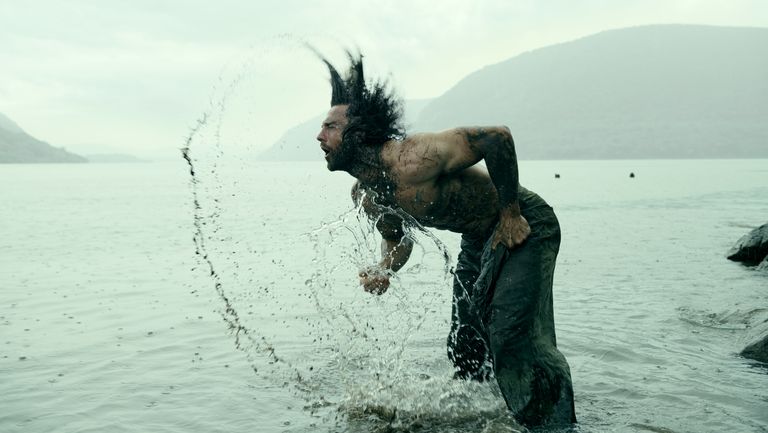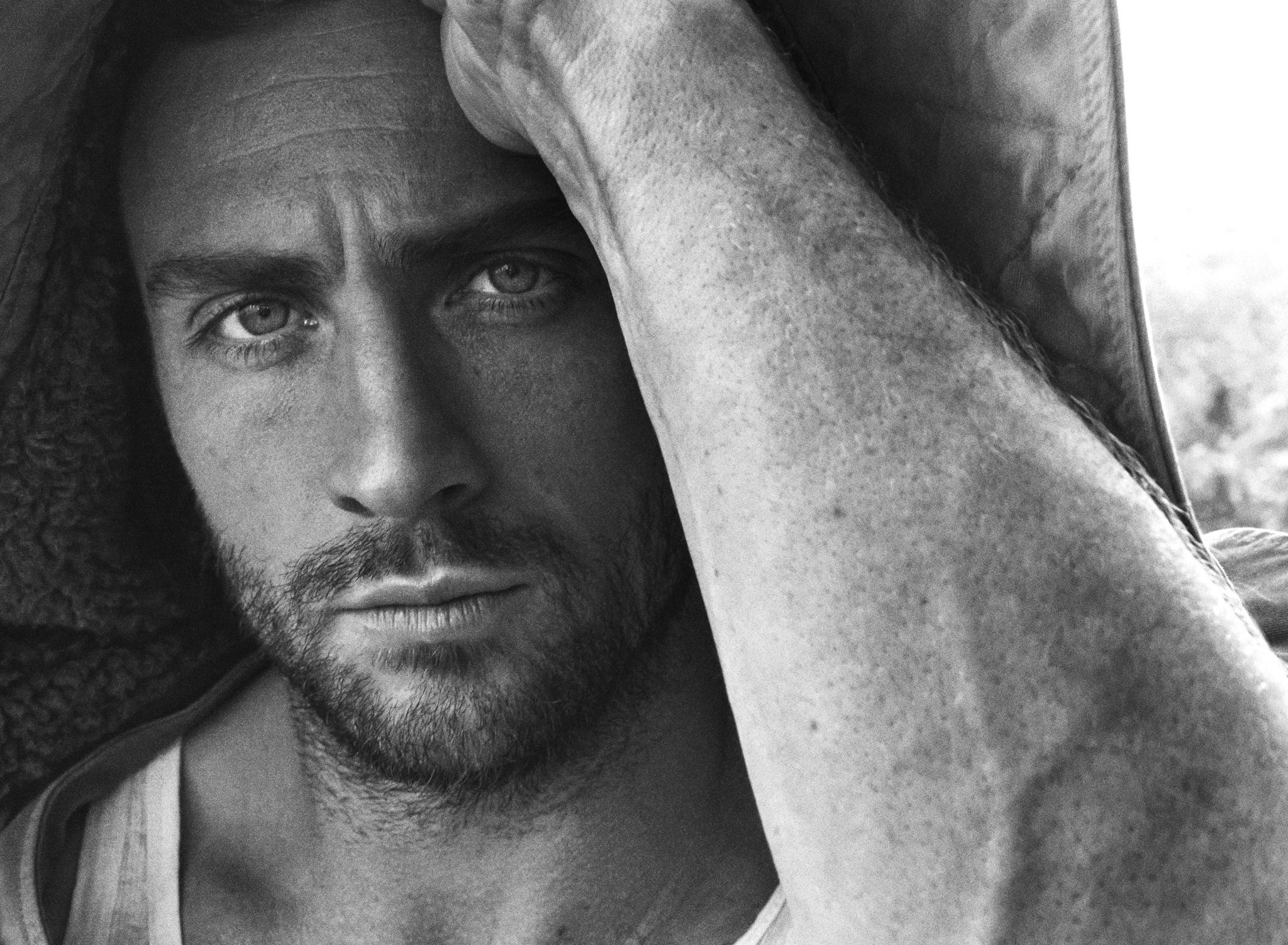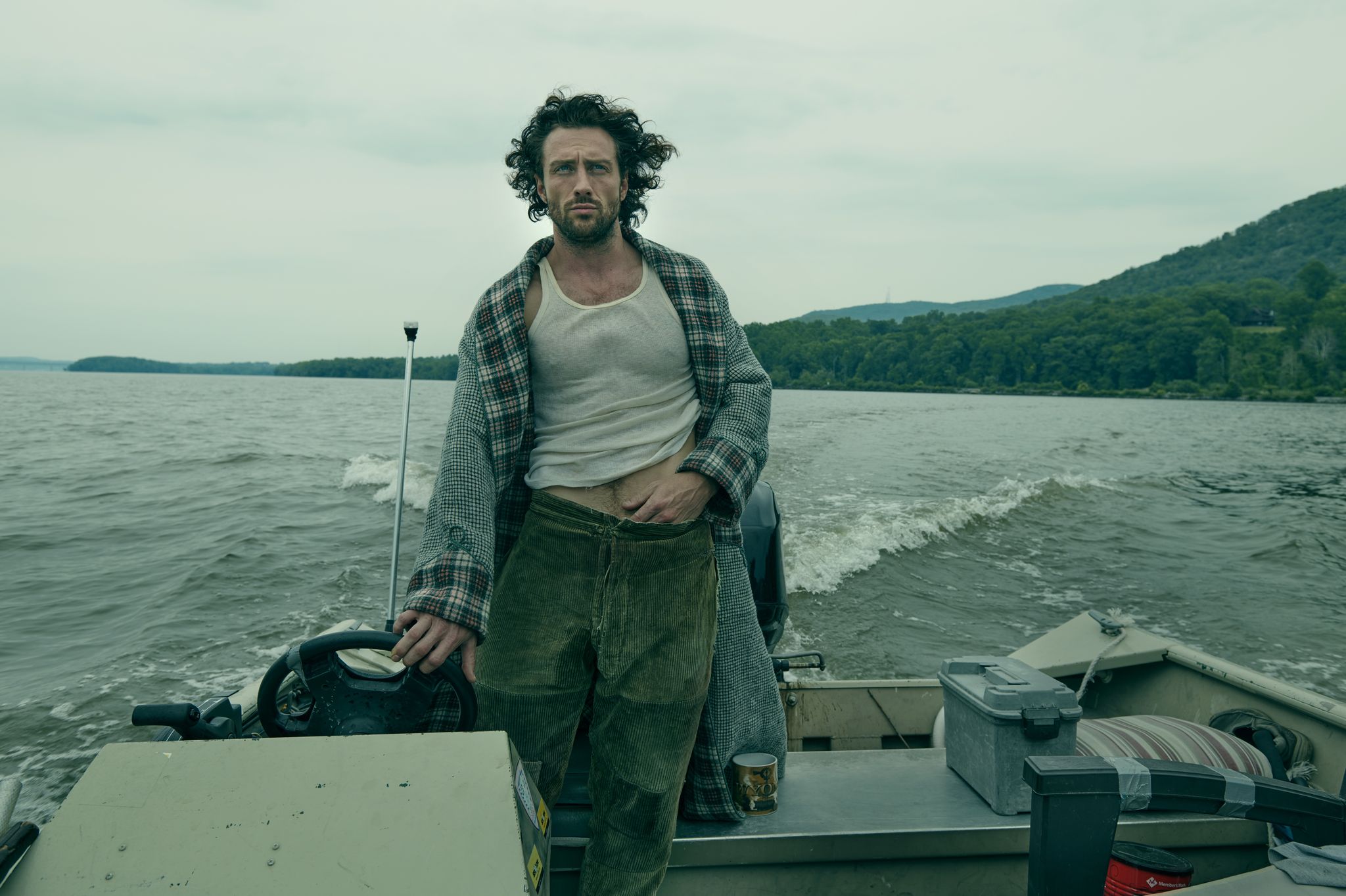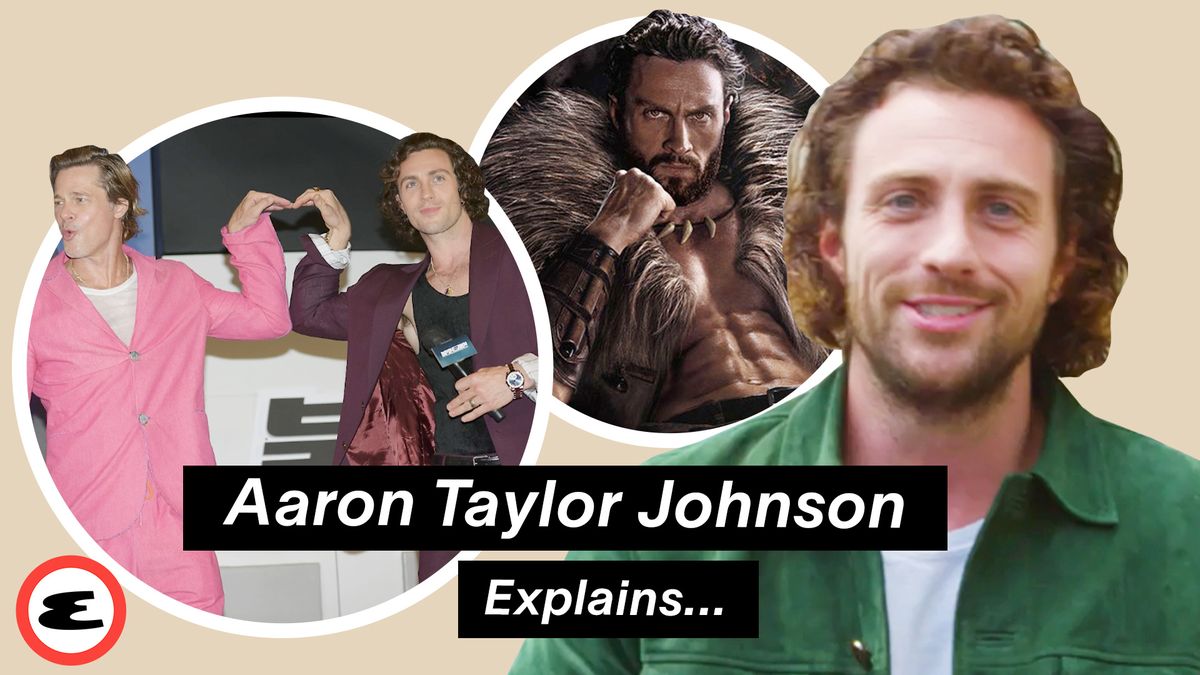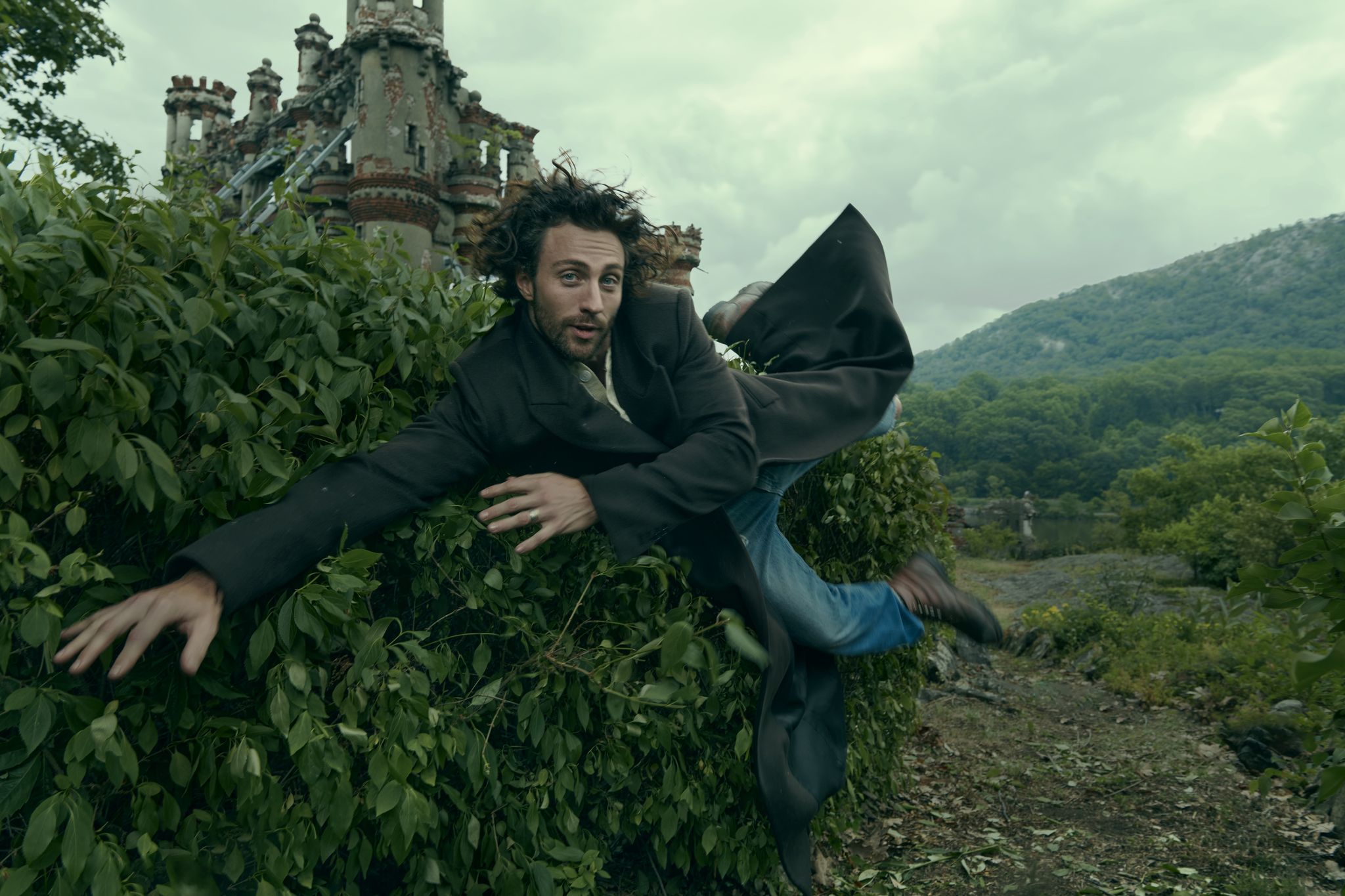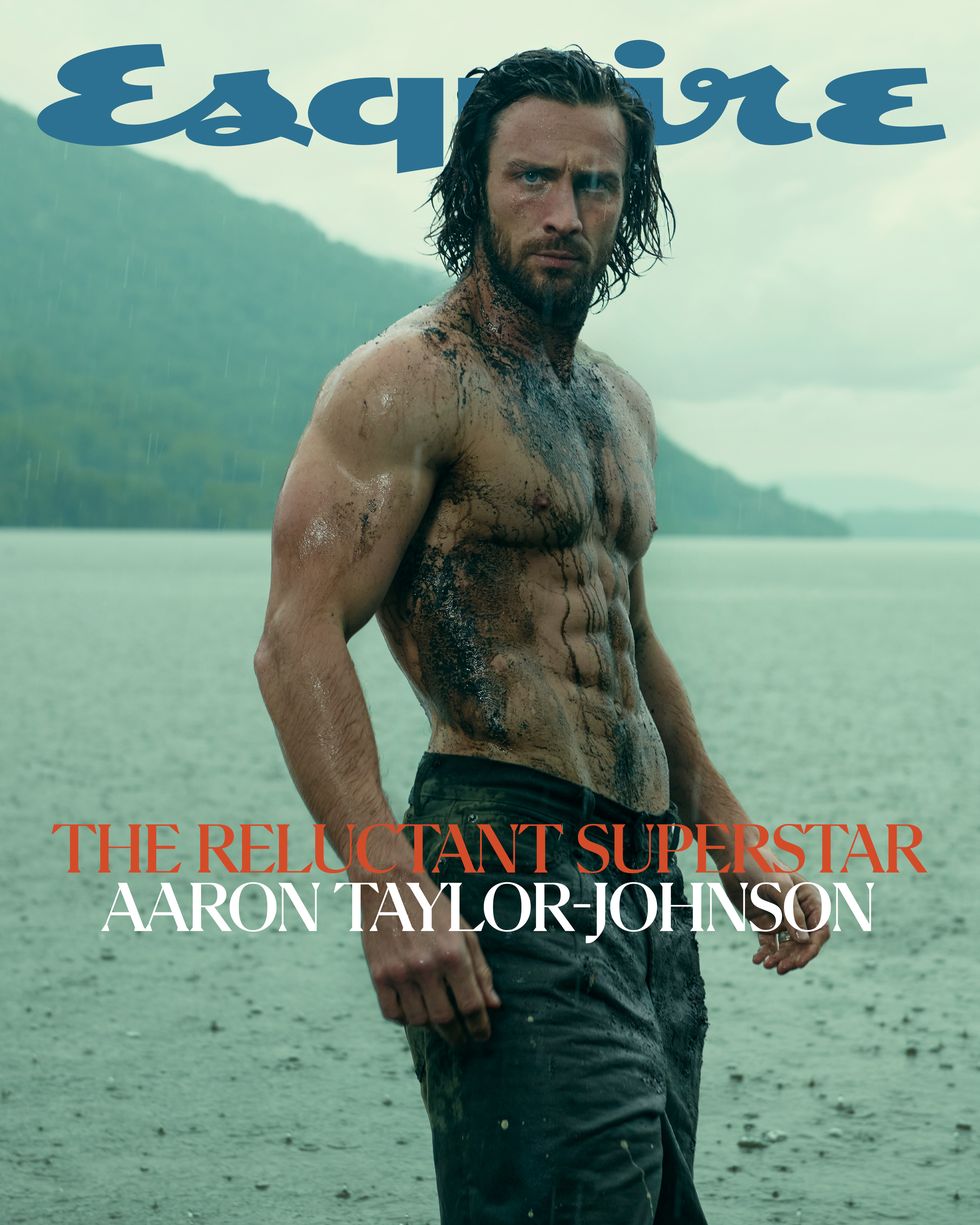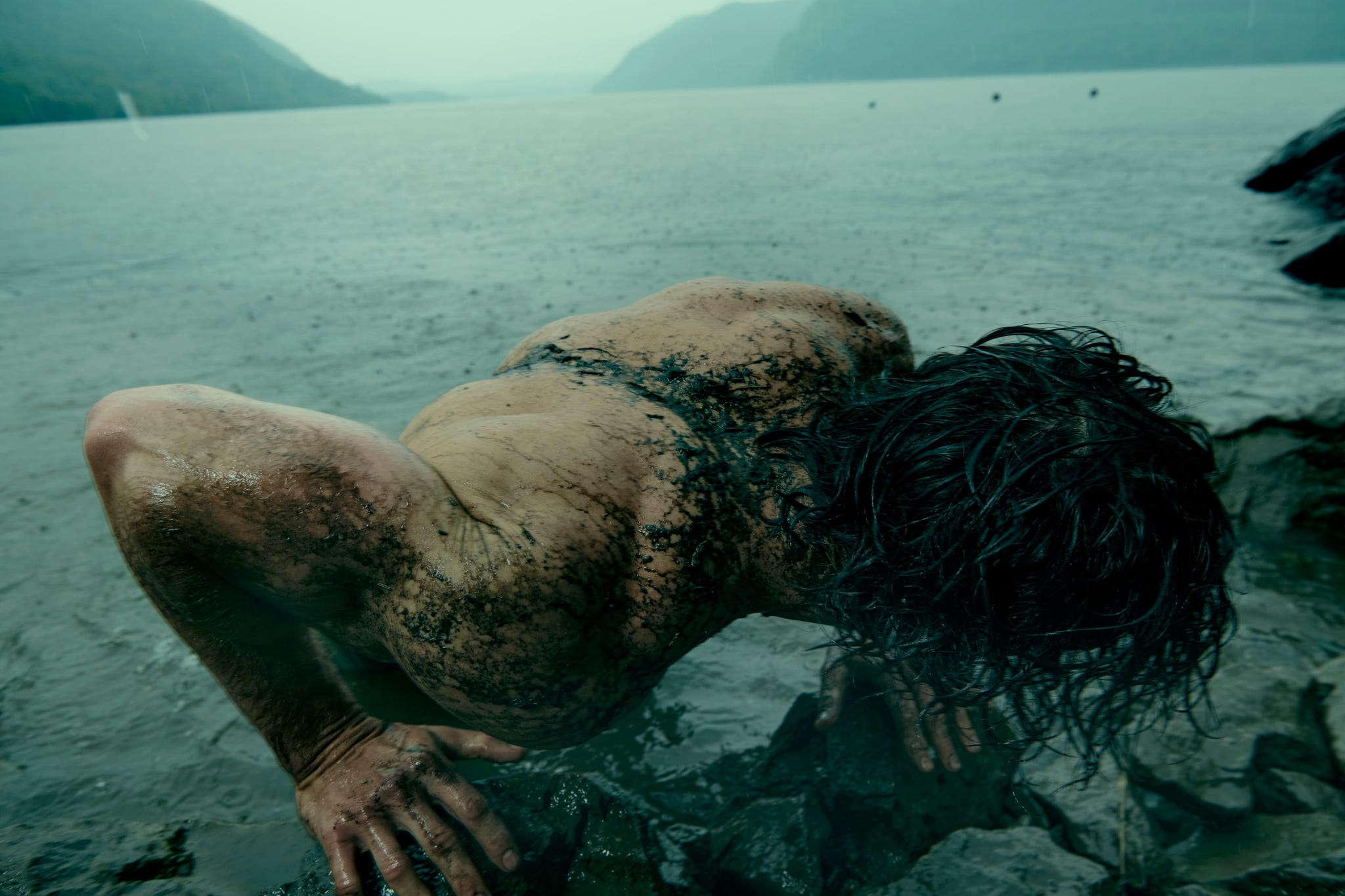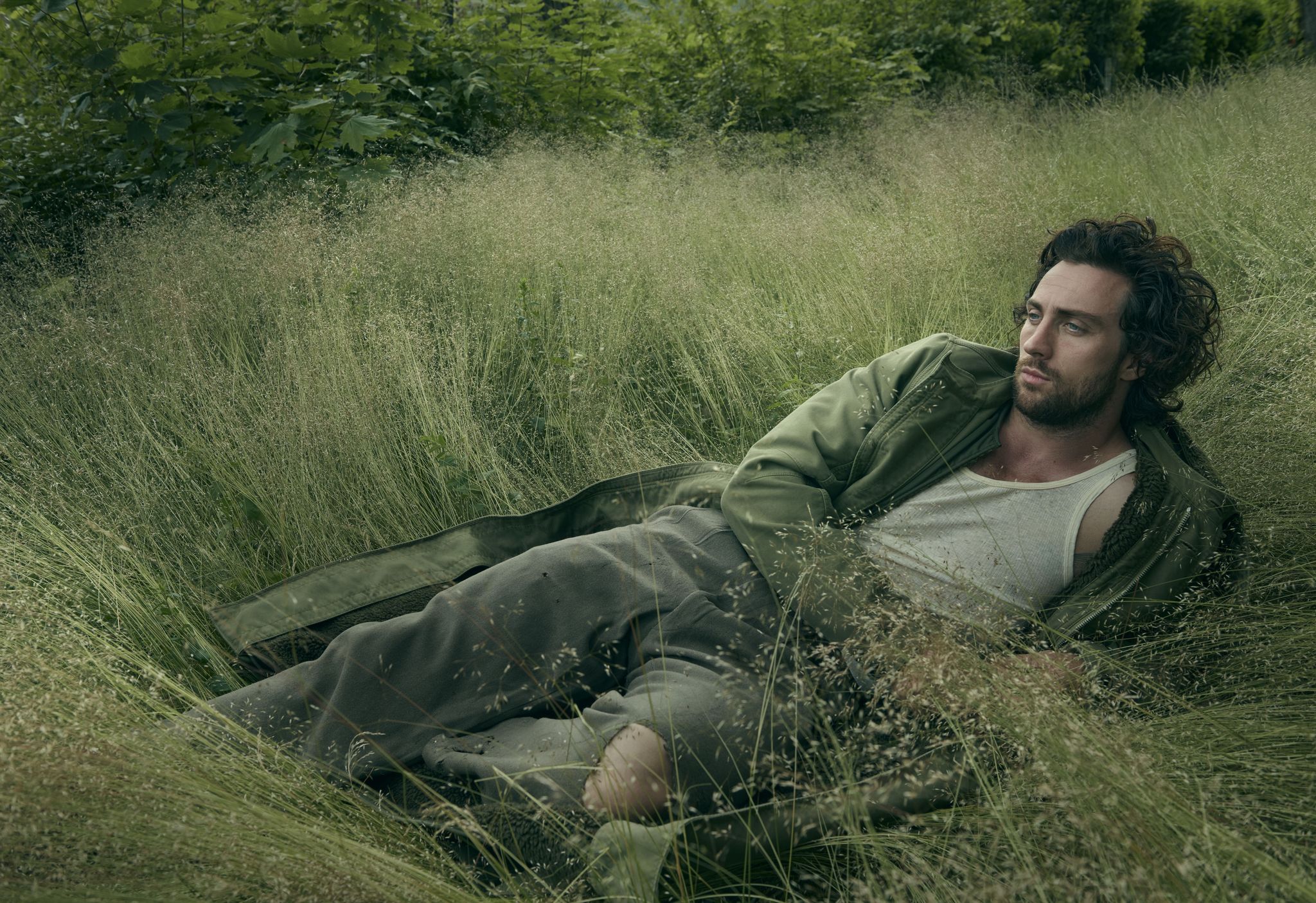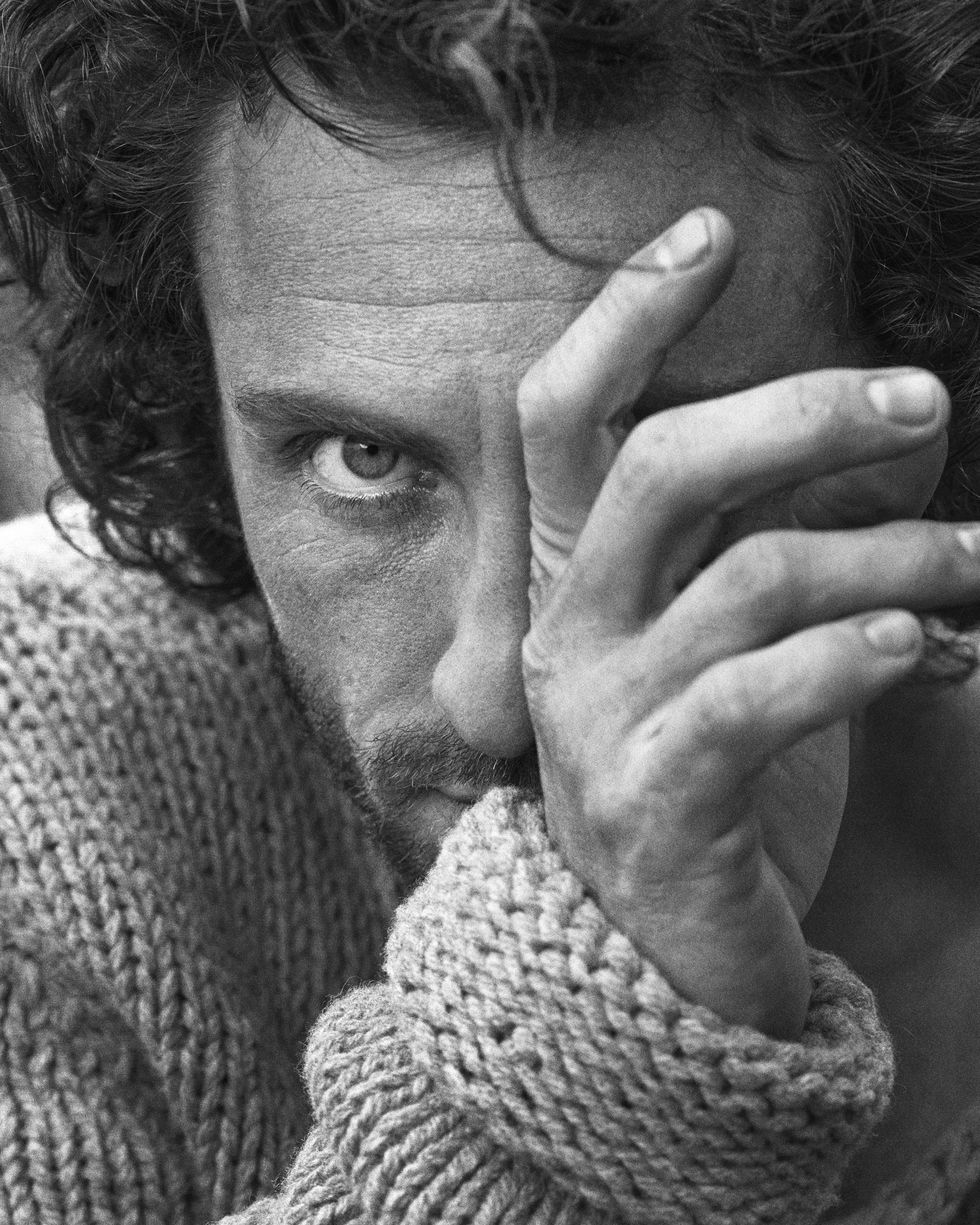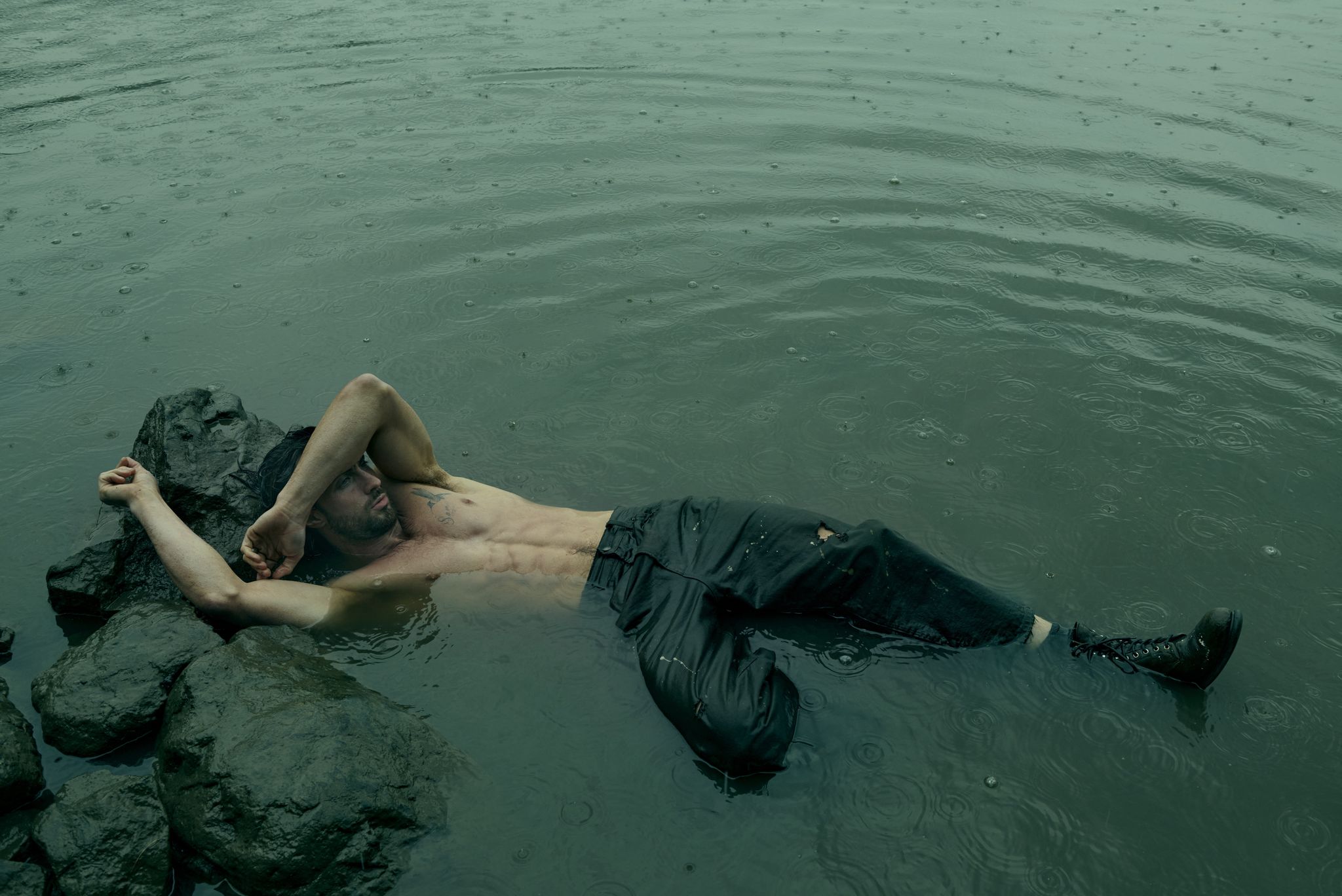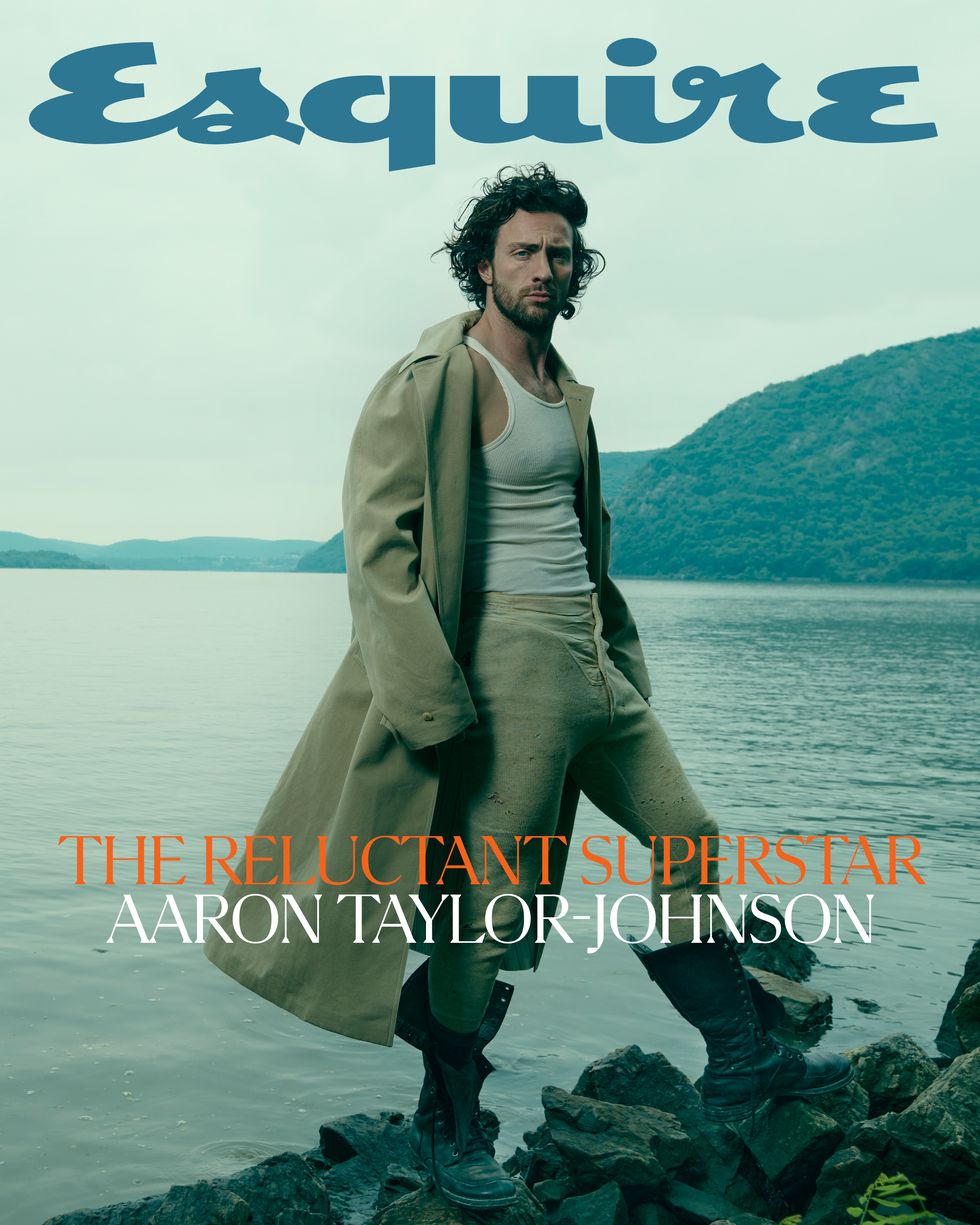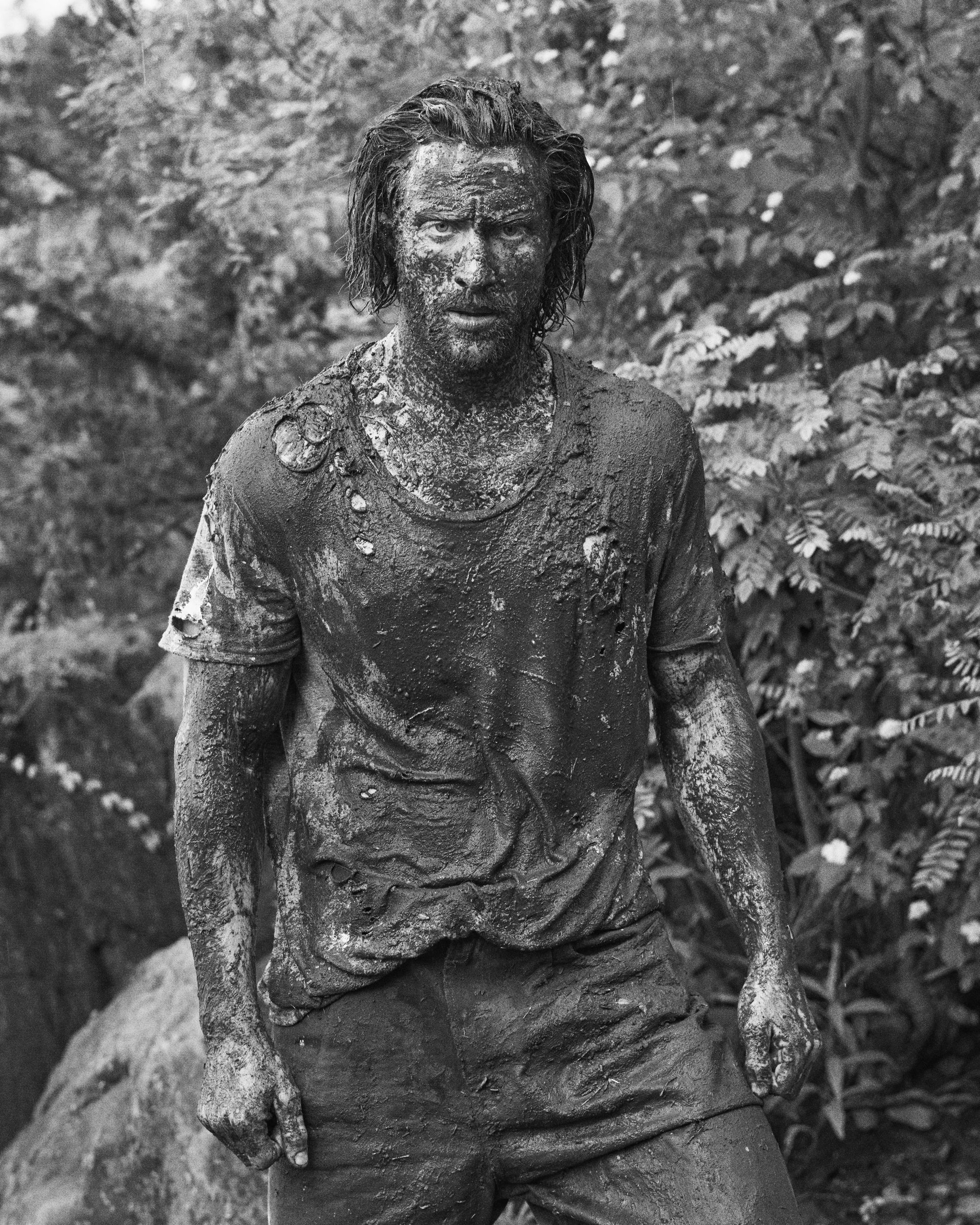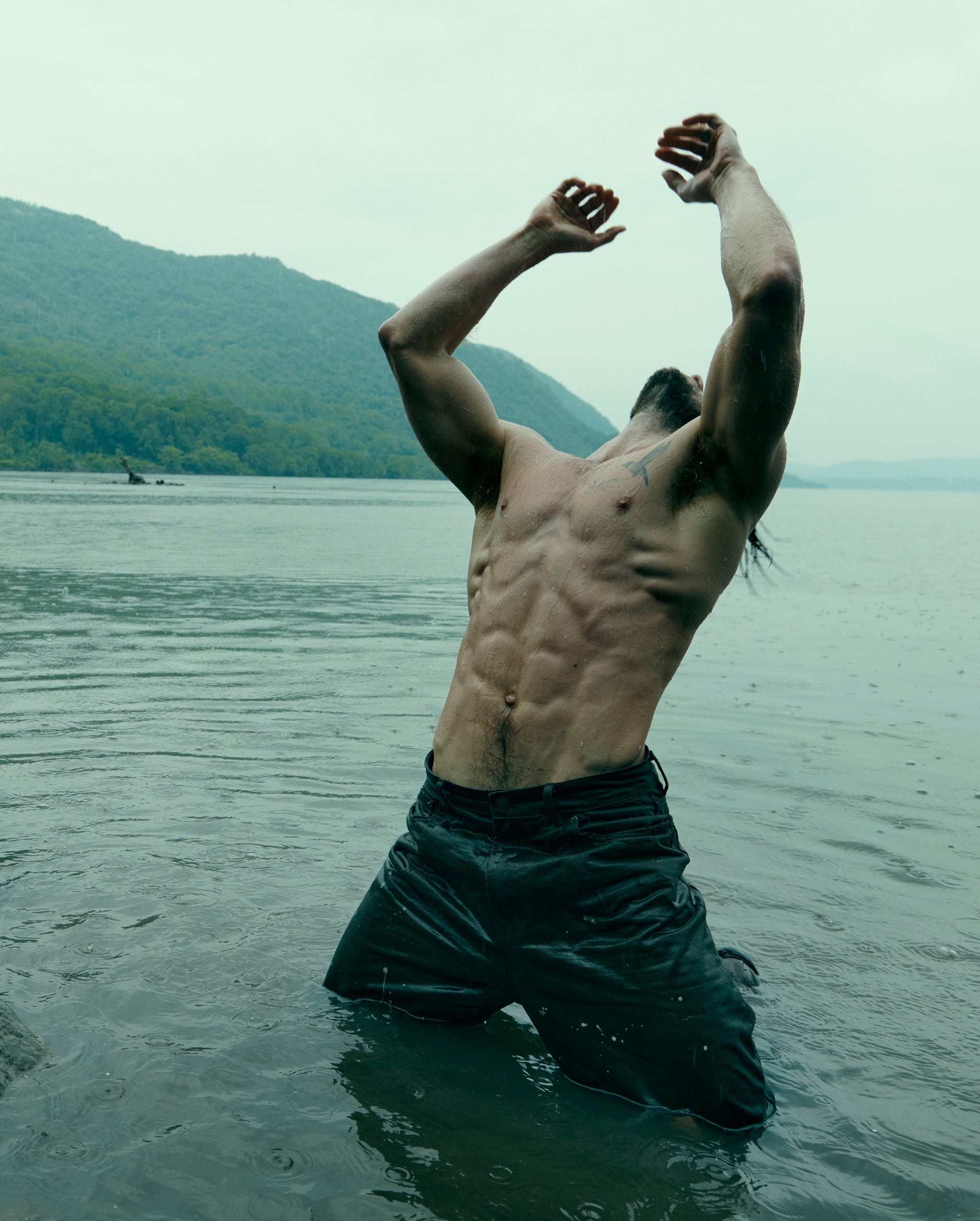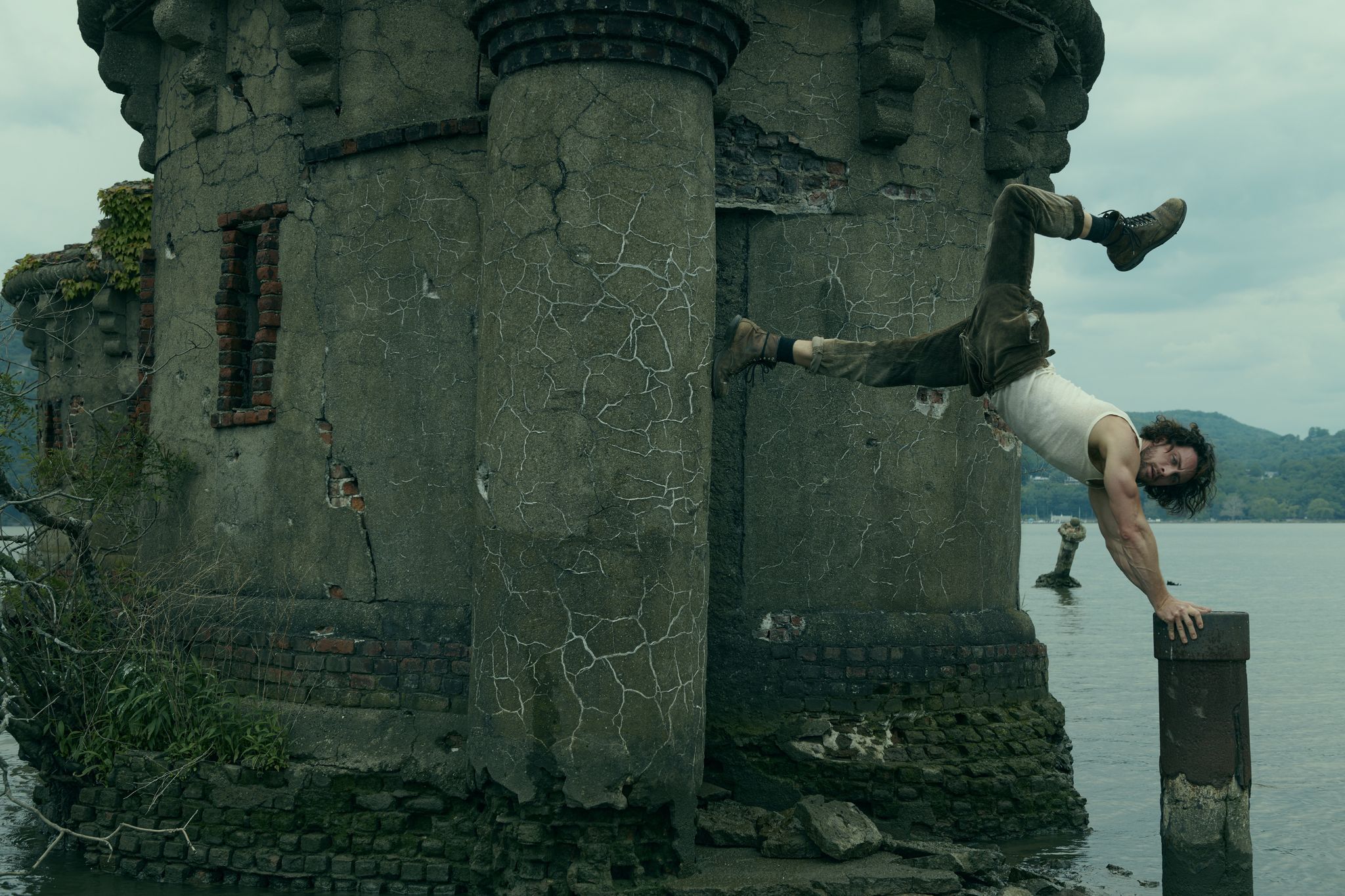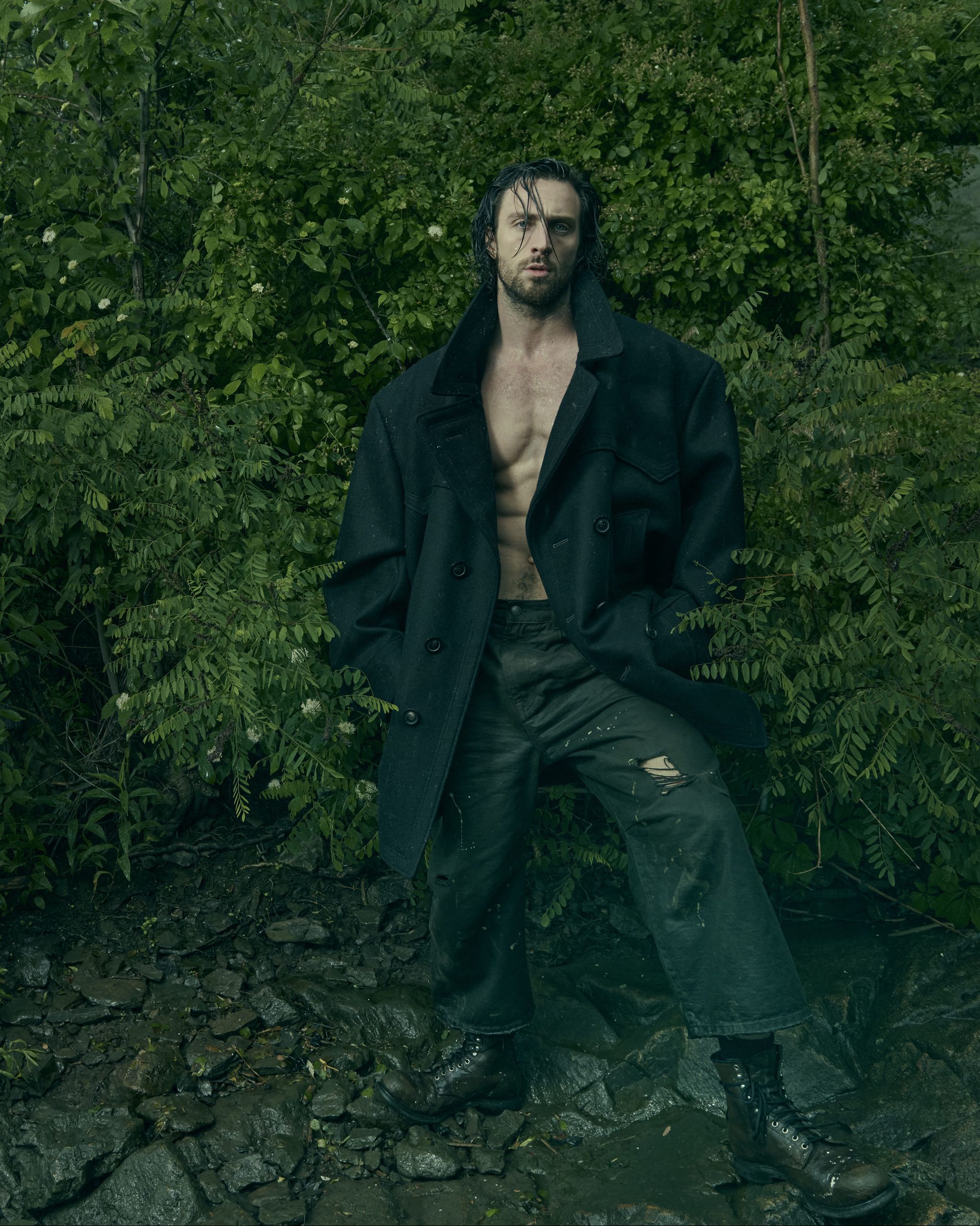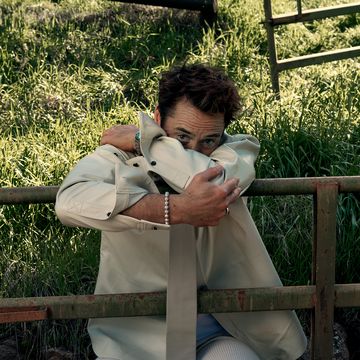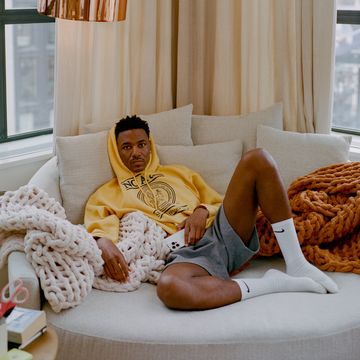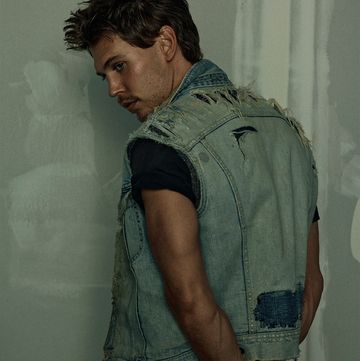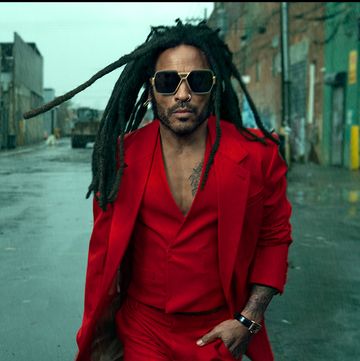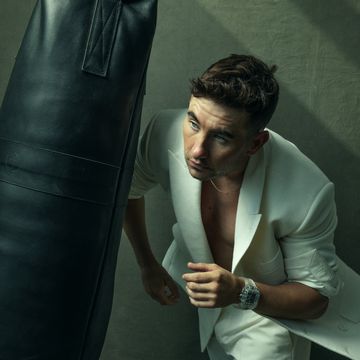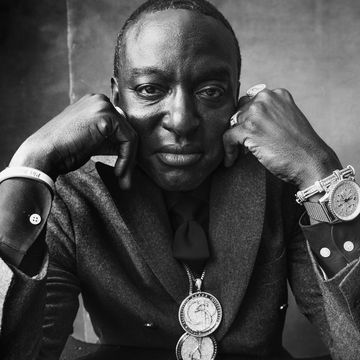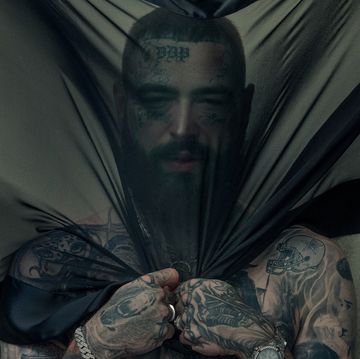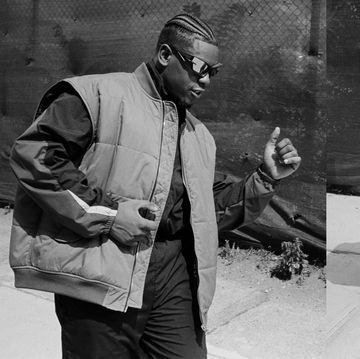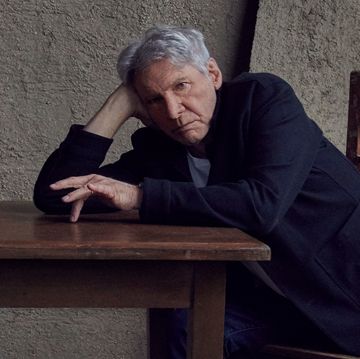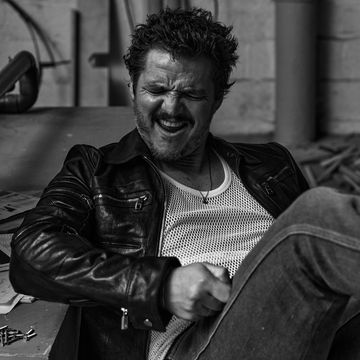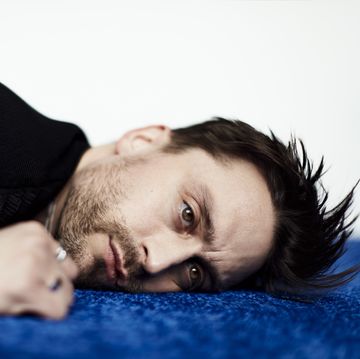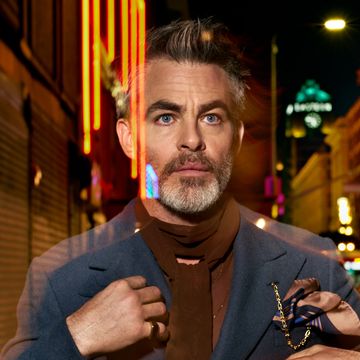A summer afternoon in New York's West Village, a warm day fast turning hotter, and inside Buvette Gastrothèque—a tiny bistro so perfectly Parisian that there’s another one in the Quartier Pigalle, a few blocks from the Moulin Rouge—Aaron Taylor-Johnson is scooping up ruddy- pink globs of steak tartare and packing them like wet sand onto little ellipses of toasted bread, one bite at a time.
The size of the space means we’re out in the open, visible. His eyes dart to the front door every time it opens. His body language says he’s ready to be recognized, to be spotted—not waiting for it but scanning, steeling for it. It doesn’t happen. Either everyone’s being chill about his presence or nobody associates the guy at the table with the things he’s been in. You’ve definitely seen him in things, though. That was him in Avengers: Age of Ultron, as a mutant dying a plot-twist death. That was him in Tenet, behind a massive Special Forces beard. Or you may have watched the long scene in Nocturnal Animals in which a redneck serial killer torments Jake Gyllenhaal and his family—just unmanning poor Jake—and thought, halfway through, Wait—is that the kid from Kick-Ass?
Which it was. He looks different in practically every movie. Mustache, no mustache. Weird hair, less-weird hair. Bulking up, slimming down. A one-man Guess Who? board. Today, his look says Young Mafia Don Bound for Miami. He futzes with a couple gold chains while he talks. They slip in and out of the collar of his seventies-dude tan polo shirt, which matches his pants, which match the suit jacket draped over his chair. His hair is longish, curly, a little sweaty. He’s lean, but his arms are like cinder blocks.
We’ve been on the record for five minutes, maybe ten, and already we’re getting into real shit. The work of parenting, the work of work. That impossible balance. The struggle to be present. He and his wife, director Sam Taylor-Johnson, are coparents to four kids, all girls, two from her previous marriage, three still at home—ages sixteen, thirteen, and eleven. “Teenagers, man,” says Aaron, who just turned thirty-three this week. “I’ve got teenagers.”
Last year, the Taylor-Johnson clan relocated to England, and he’s been explaining why. He and Sam are both from around London, and after Covid-cocooning in California, they felt the pull of home. They saw a window when they could move back without screwing up the kids’ academic lives unduly. And they both had work in the UK. Sam was directing the upcoming Amy Winehouse biopic Back to Black; Aaron had signed up to play an iconic Marvel villain in Kraven the Hunter, plus “another couple jobs that sort of set me in England for some time.”
After Kraven, he shot The Fall Guy—reteaming with Bullet Train director David Leitch on a reboot of the eighties TV series, with Ryan Gosling as the titular Guy—and then went to Prague to be in Robert Eggers’s Nosferatu, with some Kraven reshoots in between. So maybe that’s all he means by “another couple jobs.”
Except there’s talk that he’s booked, or is about to book, another fairly giant gig. He will not discuss it, not right now, but the rumor is that he’s the top contender to succeed Daniel Craig in the role of James Bond. That he crushed a secret screen test for franchise doyenne Barbara Broccoli last winter. The day we meet—mid-June, a month before the Screen Actors Guild joins the Writers Guild on strike—the oddsmakers at Ladbrokes have him at 13 to 8 to get the job. In other words, there’s about a 38 percent chance that Aaron Taylor-Johnson’s days of going unrecognized are numbered—in tiny French bistros or anywhere else.
That Kraven/Fall Guy/Nosferatu run—three different movies, three very different characters, “with only twenty-four hours between each thing”—is not the way he usually likes to work. “In my opinion, the actor that goes job to job becomes fucking boring,” he says. “You know that someone’s going to pick you up, take you to work, do your makeup, tell you, ‘Here’s your mark. These are your lines. You’re fucking great!’ And on to the next job. Fuck off. I’m sure people dream of that. If this is what you want to do, that’s great. It doesn’t feed my soul. I enjoy the normality of things, the everyday stuff. Getting my kids ready in the mornings, taking them to school and activities—that’s plenty. That feeds my soul.”
Centering that part of his life meant saying no a lot—something he says he began doing about a decade ago, not long after he first broke through and began getting cast in the kinds of movies that can lead to even bigger movies, if you’re not careful. “There was Kick-Ass,” he says, “and then there was Godzilla and Avengers, and all those things lined up for me. But I didn’t really care for them.” He was getting offers to do more of that stuff for more money. He was up for roles “that nobody knows about—big, huge franchises that were in play.” But by then he and Sam had two small children. The decision not to keep going down that blockbuster road wasn’t hard. “I wanted, purely, to be with my babies,” he says. “I didn’t want to be taken away from them. I battled with what that would be like.” Looking back, he says, “I would say I was probably not ready to be in that position anyway—it was too early. But yeah, I also slightly didn’t give a fuck.” So for a while, he did only one movie a year— supporting roles, or roles in smaller, weirder films, or both. And when he wasn’t doing that, he was at home with the kids.
They live in Somerset now. They bought an old farmhouse property in 2010 and, after putting their Hollywood Hills villa up for sale for close to $7.5 million, settled there full-time in 2022. The grass stains on Aaron’s bright-white Air Force 1’s are a trace of the English countryside. Countryside is relative, of course: The nearby town of Bruton has been called “the new Notting Hill,” a hot retreat for well-to-do Londoners, and the Taylor-Johnsons’ neighbors in the area reportedly include fashion designers Stella McCartney and Phoebe Philo, theater impresario Sir Cameron Mackintosh, and art moguls Iwan and Manuela Wirth.
But there’s country life to be had out there if you want it, and Taylor-Johnson has discovered that he does. “That’s what I love doing,” he says. “I have pigs. I have bees!”
Animals to meet. Tree houses to build for the kids. Some kind of luxe yet farmhouse-y kitchen, probably. He likes taking care of others; it carries over into his professional relationships. When you ask people what it’s like to work with him, you get a lot of stories about actorly dedication but plenty of others about carbohydrate-rich foods as a love language.
“When he bakes a cherry pie,” says Nocturnal Animals director Tom Ford, “it’s the most perfectly delicious cherry pie that you’ve ever had.”
He baked sourdough bread for Brian Tyree Henry. “I was like, ‘I’m never going to be able to repay you in bread, because I don’t fucking understand how yeast works,’ ” Henry says.
They did Bullet Train together, playing hitmen who identify as twin brothers. Taylor-Johnson was Tangerine and Henry was Lemon. “This fool went and got an actual lemon tree,” Henry says, “and sat it between our trailers. Over the course of the movie, we could watch and nurture this tree. I was like, ‘What the fuck are you thinking?’ But he got me to water this plant, spray the leaves. That’s Aaron. He’s just like, ‘We’re going to figure out how to take care of this together.’ ”
Bullet Train was a supporting role—he and Henry were two of several eccentric murderers chasing Brad Pitt around that train—but it played like a commercial for the next phase of Taylor-Johnson’s career, the actor equivalent of being “Open to Work” on LinkedIn. He hangs off the back of the speeding train wearing most of a three-piece suit (a very James Bond image, it has to be said). At one point, he and Pitt throw down in the café car. At another, a character played by Channing Tatum watches him pass by in the aisle and marvels, “God—he’s got a great walk.” It’s like one leading man recognizing another in the wild.
The check comes. Taylor-Johnson won't let Esquire get it. We decide to roll up to the High Line, grab some coffee, keep talking.
This article appeared in the September 2023 issue of Esquire
subscribe
He really does have a great walk. A cool-guy walk: big, loping strides. As we make our way up to Fourteenth Street, he talks—in short bursts, falling cautiously silent whenever anyone passes us on the sidewalk, already employing high-level blockbuster OPSEC—about what made him accept another comic-book role six years after Ultron. “I mean, quite honestly, I thought I’d actually been done with these sorts of movies,” he says.
But Bullet Train was a Sony Pictures project, as is Kraven, and when Kraven director J. C. Chandor told Sony he wanted to make an origin story, with a younger actor in the lead—a part that had reportedly been offered, over the years, to everyone from Keanu Reeves to Adam Driver—the studio suggested the guy they’d been seeing in the dailies from Leitch’s film. “When a guy can hold up his end of the tennis match with Brad Pitt,” says Tom Rothman, the chairman and CEO of Sony Pictures Entertainment’s Motion Picture Group, “you should pay attention.”
Taylor-Johnson thought the script had potential, but he wasn’t sold until he started reading the comic books. Kraven started out as a blowhard big-game hunter in leopard tights, one of many self-important antagonists foiled again and again by Peter Parker. In 1987, a writer named J. M. DeMatteis took him somewhere different. Kraven is canonically Russian, born Sergei Kravinoff in Volgograd. Thinking about Dostoyevsky, and also Hemingway, DeMatteis wrote one of the great Marvel stories of the era, “Kraven’s Last Hunt,” in which Kraven fakes Spidey’s death, assumes his identity, spares his life, and finally commits suicide by rifle.
Chandor’s movie is set before Kraven and Spider-Man’s first meeting; it’s about young Sergei’s relationship with his gangster father, played by Russell Crowe. But Taylor-Johnson and Chandor both said the character’s grim comic-book fate defined their approach to the film. “Sony probably doesn’t want me to lead with this,” Chandor says, “but the story is a tragedy. When the final credits roll on this film, if you’ve been paying attention, you won’t have the feeling that this is all going to end great.”
Taylor-Johnson understands that if this one doesn’t do well, he won't get the chance to play out Kraven’s story to the bitter end. But he also understands that he’s been entrusted with something extrinsically valuable. The state of play here: Back in 1999, long before the dawn of the Marvel Cinematic Universe or Disney’s acquisition of Marvel Entertainment, Sony Pictures acquired the rights to Spider-Man and hundreds of other Spider-Man-related characters, including Kraven. Years later, in 2015, Sony and the now-mighty Marvel Studios struck a deal to coproduce Spider-Man films set in the MCU. The most recent of those, Spider-Man: No Way Home, has grossed almost $2 billion worldwide; it’s the third-biggest superhero movie of all time, after the past two Avengers.
But so far, the success of those movies (and of Sony’s animated Spider-Verse films, widely considered the finest artistic achievements of the superhero-movie age) hasn’t guaranteed an audience for the movies Sony’s been making about all those other Spider-Man-related characters it owns the rights to. The Venom films, with Tom Hardy as another Spider- nemesis, have pulled in more than $1 billion worldwide, but Morbius (Jared Leto accidentally-on-purpose turns himself into a vampire) was an instant social-media punchline. Sony would clearly like the cinematic universe it’s building around the Spider-mythos to become a money machine on par with the MCU; it hasn’t happened yet. But positioning these films as an edgier alternative to Disney’s bright and fanciful Marvel films is one way to set them apart. Which is why Kraven rebrands a legacy villain as a violent antihero, and why the shot of Kraven biting off a dude’s nose is in the trailer.
We’ve procured a couple double espressos over ice from a coffee stall. Taylor-Johnson pays once again, then weaves through meandering tourists toward a spot he likes—a little amphitheater just off the main drag, with wooden benches facing a window that overlooks the river of traffic on Tenth Avenue. A band of laughing high school kids settles in a few rows ahead of us, toting backpacks and skateboards—a sample of the target audience for Kraven, oblivious to Taylor-Johnson’s presence. “My kids and I would come here sometimes and do a bit of parkour,” he says. “I’ve got videos of us doing that.”
Canonically, Kraven is big and near-shirtless most of the time. Taylor- Johnson says he looked at the comics and thought, Huh—the costume is my stomach and my arms. He trained heavy for months. He’s around 170 or 180 now, he says, but at his supervillain peak, he was 200 pounds. And to be believable as a hunter who takes on animal qualities to out-beast his prey, he learned to run like a quadruped.
But he also tried to build Kraven from the inside out, pulling from real people whose relationships with animals mirrored some aspect of the character—a kind of antihero’s journey. “You just grab little things,” Taylor-Johnson says, “and they rub off, in ways, and they come in handy.” He stalked deer with a hunter to understand “the emotional turmoil and the sense of guilt” that come with ending a life, studied the life and art of the late wildlife photographer Peter Beard, and spent time with the controversial conservationist Damian Aspinall, whom he describes as “a punk-anarchist, sort of Kraven- esque character” motivated by a hatred of the world’s cruelty to animals.
If this seems like a lot of attention to pay to the inner life of a guy whose motivation is to put Spider-Man’s head on the wall like a prize moose—or like an actor’s attempt to make himself feel as if he’s crafting an actual performance in a movie that chiefly needs him for his abs—well, okay, maybe it is. But it matters to him: “When you say stuff like ‘I’m the greatest hunter of all time,’ you’ve got to know deep within your being that it’s coming from a place of reality and depth, and feels like it’s possible and plausible.”
One thing about acting is that the script is not the scene; the scene is you, embodying the character, finding the story in the moment. Every good actor learns this sooner or later. Taylor-Johnson learned it by watching Jackie Chan.
The movie was Shanghai Knights, with Chan and Owen Wilson. Taylor- Johnson, around twelve at the time, was making his first American film, playing a resourceful street urchin named Charlie who wears a familiar-looking bowler hat and later reveals that his last name is Chaplin. Chan would roll up to set in the morning with his stunt team and figure out then and there which chandelier he’d swing from, which chair he’d break over whose head. “He was daring and fearlessly pushing boundaries,” Taylor-Johnson says. “People don’t do things, because they’re too afraid of looking like a fool—and that cuts out so much creativity.”
By the time he worked with Chan, he’d been acting for half his life. TV commercials at six. Shakespeare in the West End at eight—Macbeth, with Rufus Sewell as the hot-blooded king and Taylor-Johnson as Macduff’s son, getting murdered onstage three nights a week in a scene that also called for him to be naked in the bathtub. “Bollock naked,” he emphasizes. “We’re not talking wearing swimming trunks—I was fully naked.” Was this, y’know, weird? “Listen, I think in hindsight you have to unpack a lot from what my childhood was, in an adult industry, in a time like—” He pauses. “Did I feel uncomfortable? Yeah, I probably did.” He doesn’t want to talk about it further with the tape rolling. He says he’s already unpacked it privately, and this isn’t therapy; it’s the Kraven the Hunter press tour.
This article appeared in the September 2023 issue of Esquire
subscribe
After Shanghai Knights, people out in L. A. wanted to meet him. “I was pushed in front of agents and managers,” he says. “The whole fucking Disney lot. Here’s your path. You can be a fucking—” And then he pauses again, still not sure how to fill in the blank, what fucking thing the L. A. people thought they could make him into.
He says he was overwhelmed. He told his parents he didn’t want to stop acting but didn’t want to be the thing these L. A. people wanted him to be, either. He adds, “I think I smelt the bullshit. You felt like you were being sold. I went, ‘This ain’t for me. This is smoke up my ass.’ ”
He’s learned over time to trust those instincts, and when he starts to feel anxious or stressed or doubtful, it’s usually because he’s gone against his gut. “You’re just constantly trying to fine-tune what is right for you,” he says, “and fuck what everyone else thinks and the judgment outside.”
He left school at fifteen to chase acting jobs full-time. He auditioned for a million projects, got to know all the British casting directors, ran lines in waiting rooms with people who’d go on to be recognizable names: “It was me and Nick Hoult, it was Dan Kaluuya, it was Jack O’Connell.” They read for the same parts, hung out and grabbed drinks afterward. Learning who booked which gig was instructive; you could see a logic behind it, he says. “You’d be like, ‘Oh my God—Andrew Garfield’s perfect for this.’ Or ‘I don’t know why I’m here—this is Jack’s job.’ That teaches you that you’re not fucking right for everything.”
He thought about drama school but was told to come back with more experience. “I was like, ‘Experience? I’ve fucking traveled the fucking world already,’ ” he says. So he decided to try L. A. again, where he found himself auditioning alongside many of those same actors from those London casting rooms: “A little pocket of British people, all hiding under American accents.”
He slept on sofas, watched his savings burn up, got good at first impressions. “You walked into a room and you needed to be the person they thought about for the rest of the day. You had to make ’em fucking fall in love with you. It’s a bit like speed dating, I suppose. And you also got used to doing a hundred of those, and maybe one of those you’d get. Rejection, rejection, rejection. All the time.” After about six months, possibly less, he was out of money and on his way to LAX with a flight to London booked. That’s when he got the call to read for Kick-Ass.
They were shooting that one in London in 2008 when he was asked to read for Nowhere Boy, about the angry young John Lennon, pre-Beatles. He studied Lennon’s accent via YouTube and ducked out between setups to do the audition, and that’s how he met his wife. She was forty-one and he was eighteen. One year later, he proposed. Soon after, she was pregnant with their first daughter. They married in 2012, took each other’s names.
Sam was already famous when they met—one of the so-called Young British Artists, a contemporary of Damien Hirst and Tracey Emin, a friend of Elton John. When the two got together, their age gap was a source of minor controversy; Aaron has been referred to as Sam’s “toyboy” in the pages of The Mirror, The Spectator, and the Daily Mail.
At Buvette, Taylor-Johnson will talk about his family, but when I touch on his relationship, it’s like a silent alarm goes off. Since Nowhere Boy, he and Sam have worked on other projects together, like the 2018 adaptation of A Million Little Pieces—which they cowrote and Sam directed, with Aaron as James Frey—and the video for R.E.M.’s “Überlin,” featuring Aaron dancing balletically and sometimes frenetically through the streets of Shoreditch, bounding over traffic bollards, alarming pedestrians.
But he prickles when it’s suggested that their thing works because it’s rooted in creative partnership. “I don’t know,” he says. “I don’t think that’s accurate. Yeah, we worked—I met Sam as actor and director. I think we’re really great at collaborating. But that’s not why I fell in love with her.” It was another one of those gut instincts, he says—he knew right away when he met Sam but also before they met, by the time he was ten or eleven—that “I was going to have a big family. I knew I was going to be a young father. I knew I was going to have many kids.”
At some point, the wall comes up and we don’t talk about Sam anymore. He hasn’t said a whole lot, but it feels like he’s drawing a line. “I’m trying to be as honest as possible,” he says. “I’ve probably talked to you more about my kids and Sam than I have with anybody. I’ve got really nothing to hide, and I’m secure in what we have. But I’m not going to unlock things that are actually precious to me.”
He seems to be bracing himself for whatever's coming next. The end of the hanging-out-at-home years, any anonymity he’s been able to preserve by stepping away from Big IP. “I’m at a place where the exposure’s about to come again,” he says.
We meet for the second time on a Saturday morning at Gemma, the restaurant off the lobby of the Bowery Hotel, where Taylor-Johnson is staying while he’s in New York. It’s early enough that we have the whole place to ourselves—just us, the waitstaff, and Thelonious Monk plunking away on the sound system—but when Taylor- Johnson rolls in, he’s already been to the gym. This is his first big Kraven interview, and he’s still figuring out how to talk about the movie as well as how comfortable he is talking about himself in a Kraven context.
“You can’t step into this role, you can’t step into what this franchise is, with a fucking half-assed, Let’s see how it goes attitude,” he says. “You have to be mentally prepared for what could come with that. I think I’m secure in my life now to know that I’m happy to deal with that. I don’t think I was probably ready to invite that into my life earlier on.”
He’s made it clear that he’s talking about Kraven, but it’s hard to shake the sense that he’s referring to something that lies beyond that, something larger, more life-upending. It feels like the right moment to gently inquire, once more, if there’s anything in the pipeline besides what we’ve already discussed.
He says no—he’s focused on Kraven, getting it out there and making sure it becomes what it has the potential to become. “What comes from that could generate many different conversations.”
There are others who see his future in less ambiguous terms, I point out. Then I start the next sentence with the word Ladbrokes, and as soon as I do, we’re talking over each other, past each other, as if he’s pretending not to hear me.
“But this is the thing, right?” Taylor-Johnson says as I stammer about what 13 to 8 means percentage-wise. “As I’ve already told you, I have to go by the beat of my own drum. It’s my own path, what feels intuitive to me. I’ve never made a decision based on other people’s perspectives, or their judgments, or their expectations. You lose your fucking mind if you do that. Your sense of worth and soul is gone. You need to understand what is integral to you and what feels right, and you’ve got to stay on track with what’s present in front of you. Kraven is what’s in front of me.”
And he says, not for the first time since we’ve been talking, that he never really knows what the next job is until it appears, and he reiterates that he’s never wanted to be one of those actors who just go from job to job, because you don’t learn anything about the world that way.
I know you can only say so much, I say.
“It’s not really for me to say anything,” he responds.
It’s not for you to say, as in it’s not decided? Or do you really not know?
No answer. Then the polite, C’mon, bro, I can’t talk about this right now answer: “I’ve spent two years making Kraven. So all that hard work we put into trying to get that to where it is—that’s where I’m at right now.” It wouldn’t be fair, in other words, to use the platform of this conversation to talk about whatever else he might be doing in the future.
Is it exciting to consider it, though?
“I just focus,” Taylor-Johnson says, “on the things I can have in my hands right now. What’s in front of me right now.”
Awkward pause. Even Thelonious seems self-conscious. Neither of us has uttered the words “James Bond” or “007” in this exchange—it’s like we’re talking circumspectly about an actual secret agent—but it’s worth noting that at any point Taylor-Johnson could have shut this down by saying, “No, mate, I’m not fucking playing James Bond,” and he never does.
Does that mean, I ask, that I should bet on Henry Cavill?
Staring at his lap, Taylor-Johnson says, “I mean, if you’re a betting man. . . .”
I honestly don’t know what to believe. As of July, a few weeks after this breakfast took place, Ladbrokes had lengthened the odds of him being Bond to 11 to 4, which indicates about a 27 percent chance. Meanwhile, another chiseled British actor, James Norton—best known as the psychopathic killer from the BBC series Happy Valley—has surged into second place, passing Cavill.
So perhaps Aaron Taylor-Johnson is the next Bond. Or perhaps by the time you read this, the role will have gone to Mr. Bean. I don’t know. What I do believe is that if the Bond decision ends up being his to make, he won’t decide to do it purely because you don’t turn down James Bond. And I almost kind of believe him when he says, “I could probably also easily just fucking retire, and give it all up, and just enjoy being with my kids and being in the countryside.”
That was the topic he seemed most excited to talk about, on both those days. The house in the country. The bees. “These are new things in my life,” he says. “These are rare, little new things.”
They’re wild bees, as it happens. You’ve got to work your way in with wild bees. Build that trust so they’ll let you open up their house, have a look around, maybe harvest some honey.
“Luckily, I haven’t been stung,” he says. “They’re pretty calm. I stay calm, and they can read that energy.”
He doesn’t usually wear a protective suit, and he doesn’t use smoke to keep them under control. It’s not beekeeping, he says; it’s bee observing. He tries not to mess with their process. He left an empty hive out where they could find it, and the bees showed up. And when winter came, he didn’t leave sugar water out for them—he just let them do what they were going to do.
If this sounds like a metaphor, fair enough. Sometimes you let the universe take its course, and then it’s spring and there’s honey to harvest. But there’s also red meat to be had out in the world, if you decide to go looking for it.
Story: Alex Pappademas
Photos: Norman Jean Roy
Styling: Bill Mullen
Hair: Thom Priano
Grooming: Valissa Yoe for Tom Ford
Production: Boom Productions
Tailoring: Todd Thomas
Creative Direction: Nick Sullivan
Design Direction: Rockwell Harwood
Visuals Direction: James Morris
Executive Director, Entertainment: Randi Peck
Executive Producer, Video: Dorenna Newton
Photographed On Location At Bannerman Castle, Beacon, New York.
